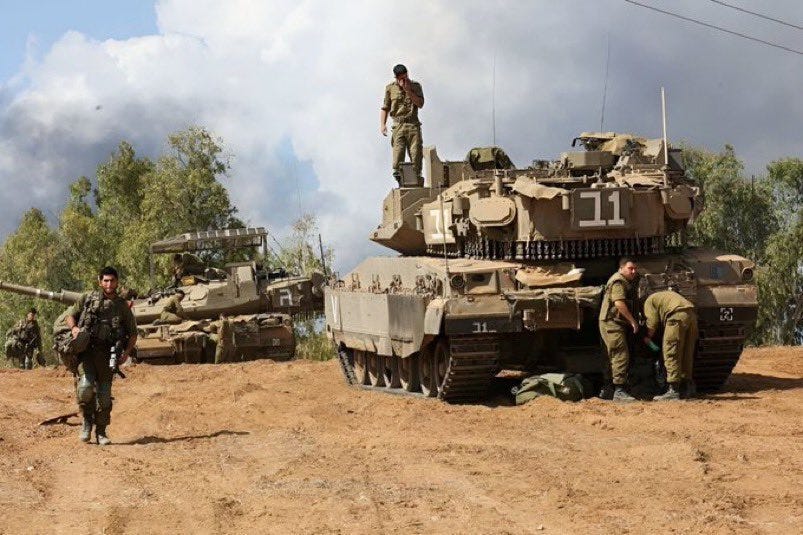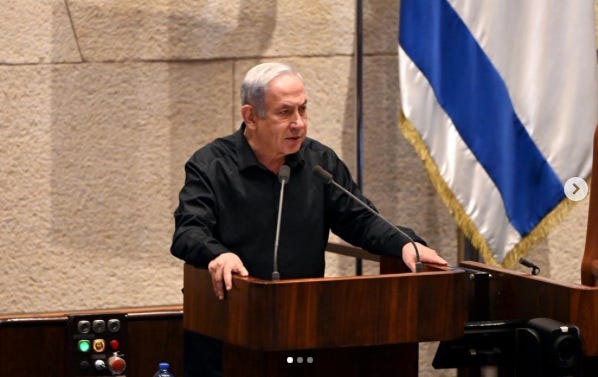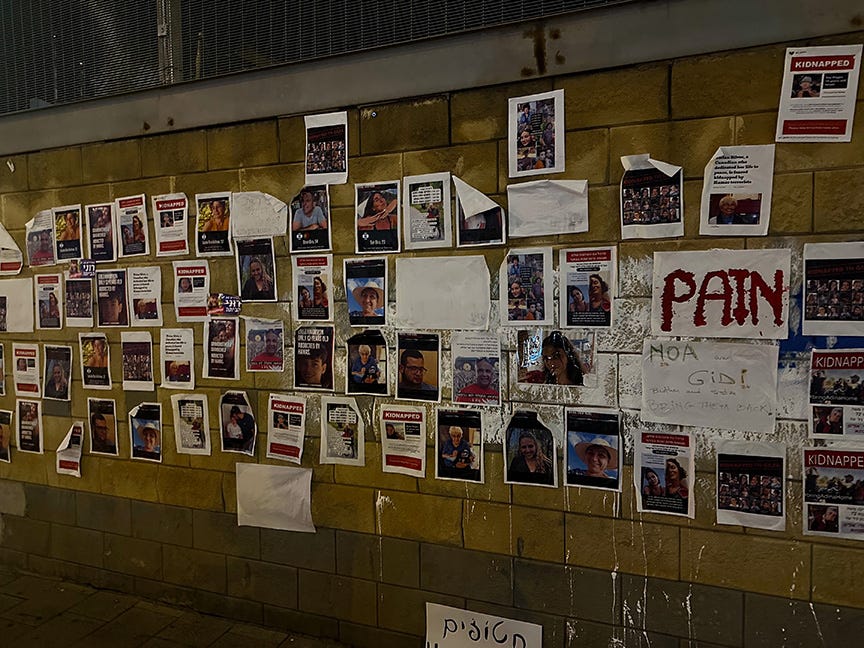Day 10 of the Gaza War: Rocket Fire Endures, Blinken Returns, a History of Hamas
Tel Aviv Diary October 16, 2023
Today marked the first day without any interactions with terrorists in the areas inside Israel, surrounding Gaza. The prevailing assumption is that all the Hamas terrorists who entered Israel on or since last Saturday have either been captured or killed.
As I began penning this update, a TV reporter mentioned that today Israel endured the fewest number of rocket attacks since the beginning of this war. However, almost immediately after he finished speaking, sirens blared, signaling another rocket attack— the fourth barrage of the day. One rocket plummeted into the sea, another targeted various parts of Tel Aviv (except our region), and the third occurred during the opening of the Knesset's winter session. During the third attack, Hamas directed rockets at both Tel Aviv and Jerusalem, compelling all Knesset members to shelter in place.
Two hours later, as the 8 o'clock news commenced, yet another barrage of rockets was launched. While I was continued to write tonight, a fifth attack targeted Tel Aviv. All the rockets aimed at the country's center were intercepted. Regrettably, one woman in Holon suffered injuries from rocket debris. As always, areas in close proximity to Gaza, such as Ashkelon and Sderot, weather much more frequent attacks.
Had this latest conflict been just another typical serial rocket barrage, discussions of a ceasefire would be imminent. However, this hostility wasn't just another volley of rockets. The gruesome atrocities and utter malevolence of the actions perpetrated last Saturday by Hamas continued be revealed as the week progressed. Television broadcasts have been inundated with harrowing reports and profiles in courage of the few who resisted the overwhelming force of Hamas. Part of me yearns to shut off the TV to avoid hearing another agonizing account, but it's an inescapable reality. The cumulative effect of this ruthless, surprise massacre on our nation is challenging to measure. When taking into account the monstrous incidents, the endless televised reports, and the massive number of funerals, it's undeniable that the entire country will grapple with some form of PTSD.
As of now, the death toll stands at 1,000 confirmed civilian, 291 soldiers, 10 security service personnel, and 54 policemen, with five officers still unaccounted for. Additionally, 455 bodies remain unidentified, and 199 families have officially informed that their loved ones have been kidnapped.
Israelis are united in their belief that this war must only conclude with Hamas's absolute defeat. Yet, the specifics of what that entails remain ambiguous, and the subsequent course of action is among the most debated topics here, both on television and in private conversations.
U.S. Secretary of State Blinken returned to Israel today, even holding a meeting with the war cabinet.
The U.S. continues advocating for a humanitarian gesture. Israel's stance is clear: No actions will be taken without, at a minimum, a visit from the Red Cross to see the abducted. Presently, there is anticipation of a potential visit from President Biden later this week.
At the opening of the Knesset, this evening, President Herzog gave a strong speech. Herzog declared:
This wonderful Israeli people, there are justified demands, and there are expectations. There are expectations from us—leaders of the people. There are expectations from this house. I say this simply: We cannot leave this war the way we entered it. This is true on the political level; this is true on the security level; and this is true on the internal-Israeli level—both politically and socially. There is a clear and basic obligation here—for sharp clarifications, for inspections of all kinds, for drawing lessons and conclusions. There is no doubt about this and there is no disagreement about this. This is an existential necessity for any life-seeking country that has experienced such a terrible disaster; however, this should not interfere with the war effort.
Prime Minister Netanyahu spoke as well, warning Hezbollah and Iran not to get involved in the war. Netanyahu affirmed that every deficiency will be investigated after the war. Although Netanyahu did not say what everyone has been waiting to hear from him— that as Prime Minister, he takes responsibility.
In contrast to Netanyahu, Shin Bet Head Ronen Bar wrote in a letter to members of the service: “Despite a series of actions we undertook, regrettably, on Saturday, we failed to provide a sufficient warning that would have allowed us to thwart the attack. As the head of the organization, the responsibility for this falls on me.”
In the North, the situation was calmer than the previous day. There was a single assault on Israeli border positions, but fortunately, no casualties were reported. In response, Israel launched a counter-barrage.
Towns and Kibbutzim situated within 2 kilometers of the Lebanese border were officially evacuated. This included the towns of Shlomi and Metulah.
This evening, I passed by the Israeli Defense Headquarters, where various groups expressed a spectrum of Israeli opinions. One group held a sign declaring “No stopping until we win.” The second, and largest, group was demonstrating their concern for the kidnapped.
At the same time, another faction protested, demanding Netanyahu resigns.However, any discussions about Netanyahu stepping down will have to be postponed until after the war concludes. Forcing him out of office now would signify a victory for Hamas.
One of my readers expressed concern that I was allocating excessive attention to the hostages. This reader felt that Israel should make decisions without being overly influenced by the fate of the captives. I did not get a chance to answer directly, but here is why I continue to write about the hostages seized by Hamas:
The widespread support for the families of the kidnapped is a direct result of the government's inadequate response. In many cases, families have received just one phone call, and some haven't been contacted at all. This government, arguably the most inept in Israel's history, is tasked with navigating one of the most challenging periods any Israeli administration has ever faced.
I believe the IDF will attempt a rescue, if an opportunity arise.
Here’s a short history of Hamas
The Muslim Brotherhood has been active in the Gaza Strip and other areas of Israel/Palestine since the 1940s. For many years, it focused on social action and religious observance. However, during the first Intifada, which began in December 1987, Hamas (Harakat al-Muqawamah al-Islamiyya) or the Islamic Resistance Movement was established.
Sheikh Ahmed Yassin, a Palestinian cleric, was one of the founders of Hamas. Yassin aimed to create an organization that would not only offer social welfare programs, but also participated in armed resistance against the Israeli occupation. This dual strategy has defined the identity and actions of Hamas since its beginning. On the one hand, Hamas ran hospitals, schools, and other social services; on the other, Hamas has maintained a military wing known as the Izz al-Din al-Qassam Brigades.
Hamas's charter, penned in 1988, advocates for the establishment of an Islamic Palestinian state in place of Israel. Hamas firmly rejects any negotiations or peace agreements with Israel.
Before the Second Intifada, Hamas executed several terrorist attacks, typically in the form of suicide bombings:
April 16, 1993: Mehola Junction bombing targeting an Israeli bus stop, killing two.
April 13, 1994: Afula Bus suicide bombing in Afula killed 8.
October 19, 1994: Dizengoff Street Bus bombing in Tel Aviv killed 22.
November 11, 1994: Netzarim Junction bicycle bombing killed 3 Israeli soldiers.
January 22, 1995: Beit Lid Junction bombing targeting Israeli soldiers killed 21.
April 9, 1995: Kfar Darom Bus bombing killed 7, including children.
July 24, 1995: Ramat Gan bus 20 bombing in Tel Aviv killed 6.
August 21, 1995: Ramat Eshkol bus bombing in Jerusalem killed 4.
February 25, 1996: Ashkelon bus station bombing killed 1.
February 25, 1996: Jaffa Road bus bombings in Jerusalem killed 26.
March 3, 1996: Dizengoff Center suicide bombing in Tel Aviv killed 13.
March 4, 1996: Jerusalem bus 18 bombings killed 19.
July 30, 1997: Mahane Yehuda Market bombings in Jerusalem killed 16.
September 4, 1997: Ben Yehuda Street bombings in Jerusalem killed 5.
October 29, 1998: Gush Katif Junction bombing killed 1 Israeli soldier.
It’s important to note that the bombings which took place in 1996 were instrumental in convincing Israelis that peace with the Palestinians was near impossible and helped elect Benjamin Netanyahu, over Shimon Peres.
During the Second Intifdah Hamas was responsible for some of the most horrendous terror bombings:
March 4, 2001: A car bomb exploded in Netanya, killing 3 people.
June 1, 2001: Dolphinarium discotheque bombing in Tel Aviv killed 21 people, most of them teenagers.
August 9, 2001: Sbarro restaurant suicide bombing in Jerusalem killed 15 people.
December 2, 2001: Ben Yehuda Street bombings in Jerusalem killed 11 people.
March 27, 2002: Passover massacre at the Park Hotel in Netanya killed 30 people, prompting Israel's Operation Defensive Shield.
March 31, 2002: Matza restaurant suicide bombing in Haifa killed 15 people.
May 7, 2002: Rishon LeZion bombing at a pool hall killed 16 people.
June 18, 2002: Patt Junction Bus bombing in Jerusalem killed 19 people.
July 16, 2002: A double suicide bombing in Tel Aviv killed 5 people.
July 31, 2002: Hebrew University bombing in Jerusalem killed 9 people.
March 5, 2003: Haifa bus 37 suicide bombing killed 17 people.
May 18, 2003: A suicide bomber detonated on a Jerusalem bus, killing 7 people.
June 11, 2003: Jerusalem bus 14A suicide bombing killed 17 people.
August 19, 2003: Jerusalem bus 2 bombing killed 23 people.
September 9, 2003: A suicide bombing at the Tzrifin bus stop killed 9 people.
January 29, 2004: Gaza Street bus bombing in Jerusalem killed 11 people.
March 14, 2004: Double suicide bombing at the Ashdod Port killed 10 people.
August 31, 2004: Two buses were targeted in Beersheba, killing 16 people.
January 13, 2005: Karni crossing attack killed 6 Israeli civilians.
In 2006, Hamas participated in the Palestinian legislative elections and secured a surprising majority. In 2007, Hamas seized power in the Gaza Strip, often by throwing Fatah representatives off tall buildings. Since that time, Gaza has been under Hamas control, while the West Bank remains governed by the Palestinian Authority, which is led by Fatah.
When Hamas took control, representatives of the Quartet (UN, US, Russia, and EU) met with its leadership. They stipulated that in order to receive international aid, Hamas would need to:
Recognize the State of Israel.
Renounce violence.
Accept previously signed agreements between Palestinians and Israelis.
Hamas refused these conditions, leading to its international isolation. Consequently, Israel imposed a blockade on Gaza. This initiated a series of intermittent rocket attacks on Israel, leading to four brief wars.
Significant Hamas attacks include the 2008 clash, where Israel resorted to a ground invasion, following incessant rocket fire from Hamas, and the 2014 assault wherein Hamas employed tunnels to invade Israel prompting another Israeli ground operation in Gaza. Further Hamas escalations were witnessed in 2018, with border fence protests in Gaza and rocket exchanges, and again in May 2021, with an 11-day rocket exchange.
However, October 7, 2023, marked a somber, sobering turning point. On Shabbat morning, on the holiday of Simchat Torah at 6:30 AM, Hamas launched rockets across Israel and simultaneously deployed substantial forces (over 2000 terrorists) across the border, inflicting over 1,300 Israeli casualties on that single day.








Marc, I do not agree with you that Netanyahu should remain in power for now because for him to resign would be a victory for Hamas. That's far less important, I think, than the fact that his leaving would be a saving victory for the people of Israel. The man has poisoned everything and brought catastrophe upon the society he was elected to lead. Every day that he continues in office puts Israel at risk. We can't trust a thing he says or does or any decision he makes.
Thanks - interested in details on the claim that Bibi help fund Hamas , promoting it also as an alternative to the P- A , avoiding peace talks